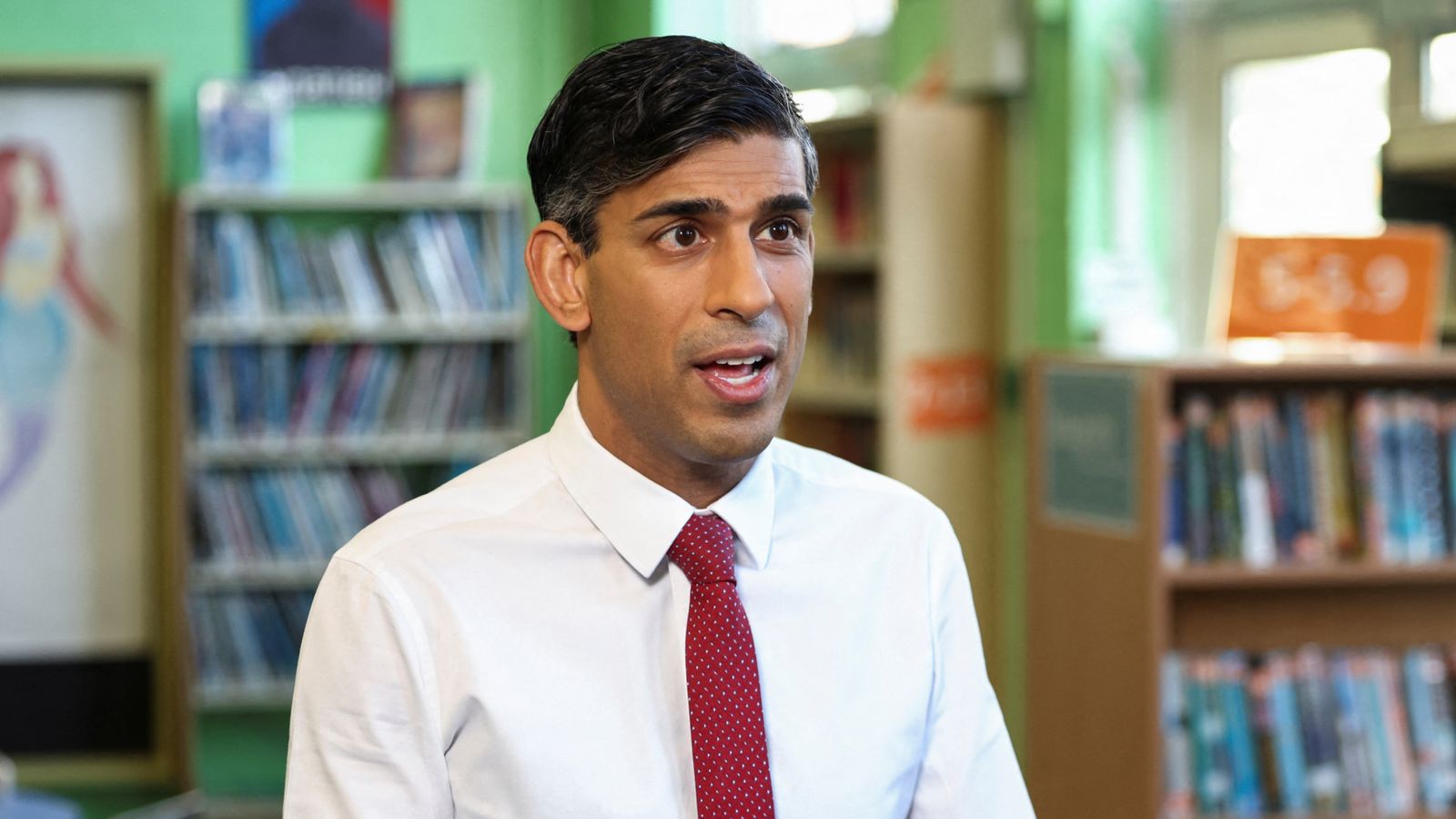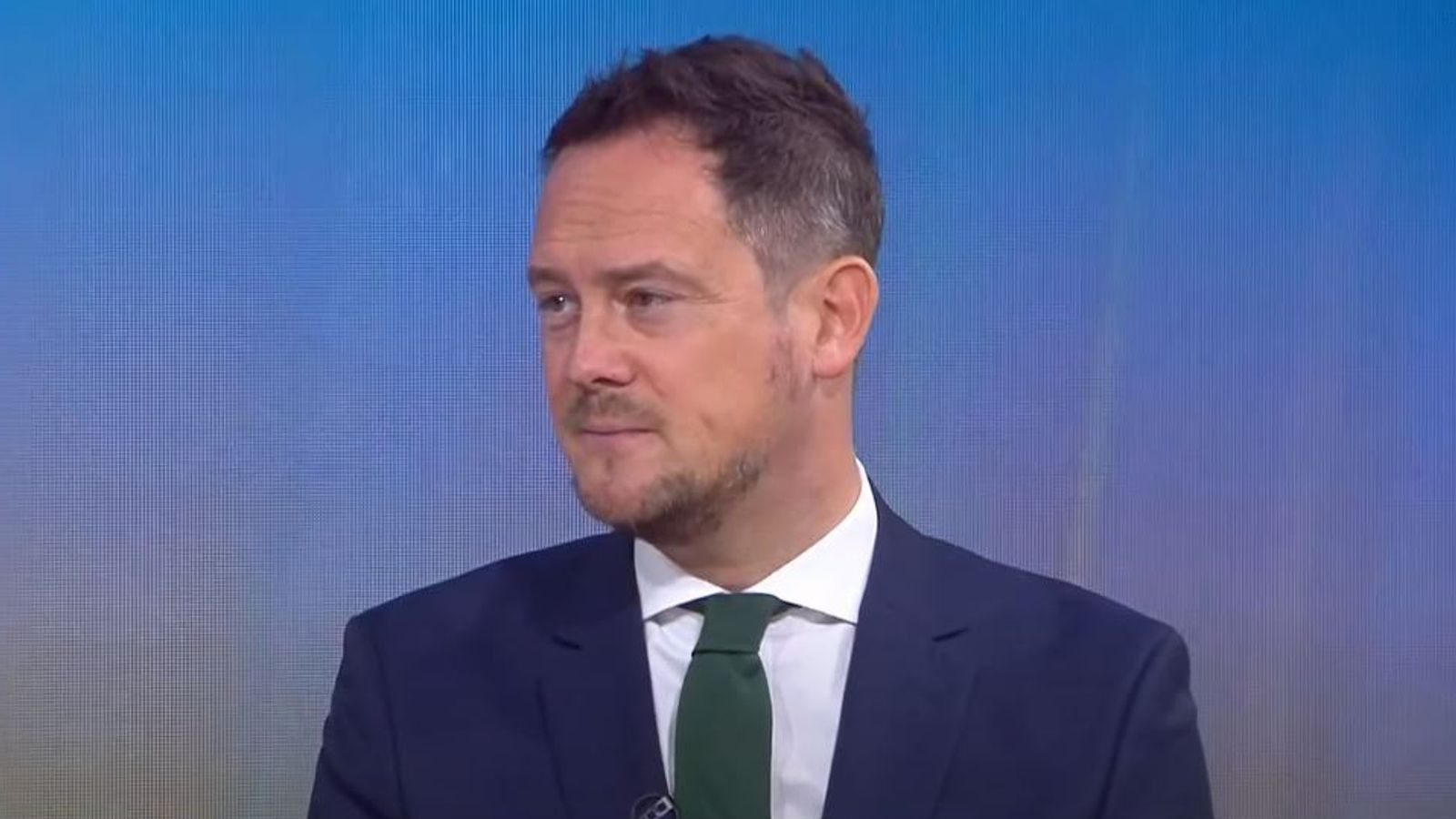PM says it’s ‘completely wrong’ to suggest he slashed funding for school rebuilding as chancellor


Rishi Sunak said it is “completely and utterly wrong” to suggest he is to blame for failing to fully fund a programme to rebuild England’s crumbling schools.
The prime minister dismissed claims about his record as chancellor as he acknowledged hundreds more schools in England could be affected by unsafe concrete.
Thousands of pupils face disruption at the start of term this week following an order to fully or partially close 104 schools because of concerns about reinforced autoclaved aerated concrete (RAAC), which is prone to collapse.
Labour reshuffle under way – follow Politics Hub live
Pupils face being taught in temporary classrooms, on different sites or even forced into pandemic-style remote lessons.
In his first comments since the debacle emerged, Mr Sunak said that 95% of England’s schools were unaffected, leaving open the possibility that more than a thousand could still be impacted by concerns over RAAC.
He said: “Of course I know the timing is frustrating, but I want to give people a sense of the scale of what we are grappling with here: there are around 22,000 schools in England and the important thing to know is that we expect that 95% of those schools won’t be impacted by this.”
If, as Mr Sunak said, 5% of schools are impacted, that would mean 1,100 are affected.
However, the prime minister’s official spokesman suggested the safety issues won’t be as widespread as that.
Advertisement
He told reporters: “I think the prime minister was providing reassurance to parents, pupils and schools that the vast majority – we believe more than 95% – won’t be affected.”
Click to subscribe to the Sky News Daily wherever you get your podcasts
The government issued a last minute warning to schools about RAAC after a beam previously thought to be safe collapsed.
Previously guidance had stated RAAC should be removed where it is in critical condition, but now ministers say all RAAC should be removed.
Concerns about the material – which was widely used from the 1950s to mid-1990s – have been raised for years.
Earlier Jonathan Slater, who was secretary at the Department for Education (DfE) from May 2016 to August 2020, claimed the Treasury had failed to fully fund school rebuilding schemes – including during Mr Sunak’s time at the helm.
He said he was “absolutely amazed” that a decision was made after he left the department to halve the school rebuilding programme.
Mr Slater said up to 400 schools a year need to be replaced, but the DfE got funding for 100 while he was the senior official.
Mr Slater said there was a “critical” risk to life in some schools.
He told BBC Radio 4’s Today programme: “The actual ask in the Spending Review of 2021 was to double the 100 to 200 – that’s what we thought was going to be practical at first instance.
“I thought we’d get it, but the actual decision that the chancellor took in 2021 was to halve the size of the programme.”
But asked if he was to blame for the concrete crisis, Mr Sunak said: “I think that is completely and utterly wrong.
“Actually, one of the first things I did as chancellor in my first spending review in 2020 was to announce a new 10-year school re-building programme for 500 schools.
“Now that equates to about 50 schools a year, that will be refurbished or rebuilt.
“If you look at what we have been doing over the previous decade, that’s completely in line with what we have always done.”
PM ‘putting lives at risk’
However, Labour insisted Mr Sunak “bears huge culpability for his role in this debacle” – saying funding for rebuilding schools has been slashed over the years.
Analysis published by the party found that spending on school rebuilding between 2019 and 2020 was at £765m, but this fell to £560m the following year.
Spending dropped again to £416m in 2021 to 2022, the party said.
Bridget Phillipson, the shadow education secretary, said: “The defining image of 13 years of the Conservative-run education system will be children sat under steel girders to stop the roof falling in.
“Rishi Sunak bears huge culpability for his role in this debacle: he doubled down on Michael Gove’s decision to axe Labour’s schools rebuilding programme and now the chickens have come home to roost – with yet more disruption to children’s education.”
The Department for Education has so far refused to say which schools are affected.
‘Extra money’ will be available – Sunak
On Monday Education Secretary Gillian Keegan vowed to publish a list of the schools affected by the concrete crisis this week.
She also sought to clarify concerns around costs, insisting her department will pay for repairs and temporary accommodation.
Ms Keegan could not say how much the DfE will ultimately have to ringfence – but admitted the concrete crisis will likely cost “many many millions”.
Despite both Ms Keegan and Treasury sources suggesting the money will come from the DfE’s existing budget, Mr Sunak said “extra money” will be made available.
Mr Sunak said: “The Chancellor has been crystal clear that schools will be given extra money for these mitigations, it won’t come from their existing school budgets.”


